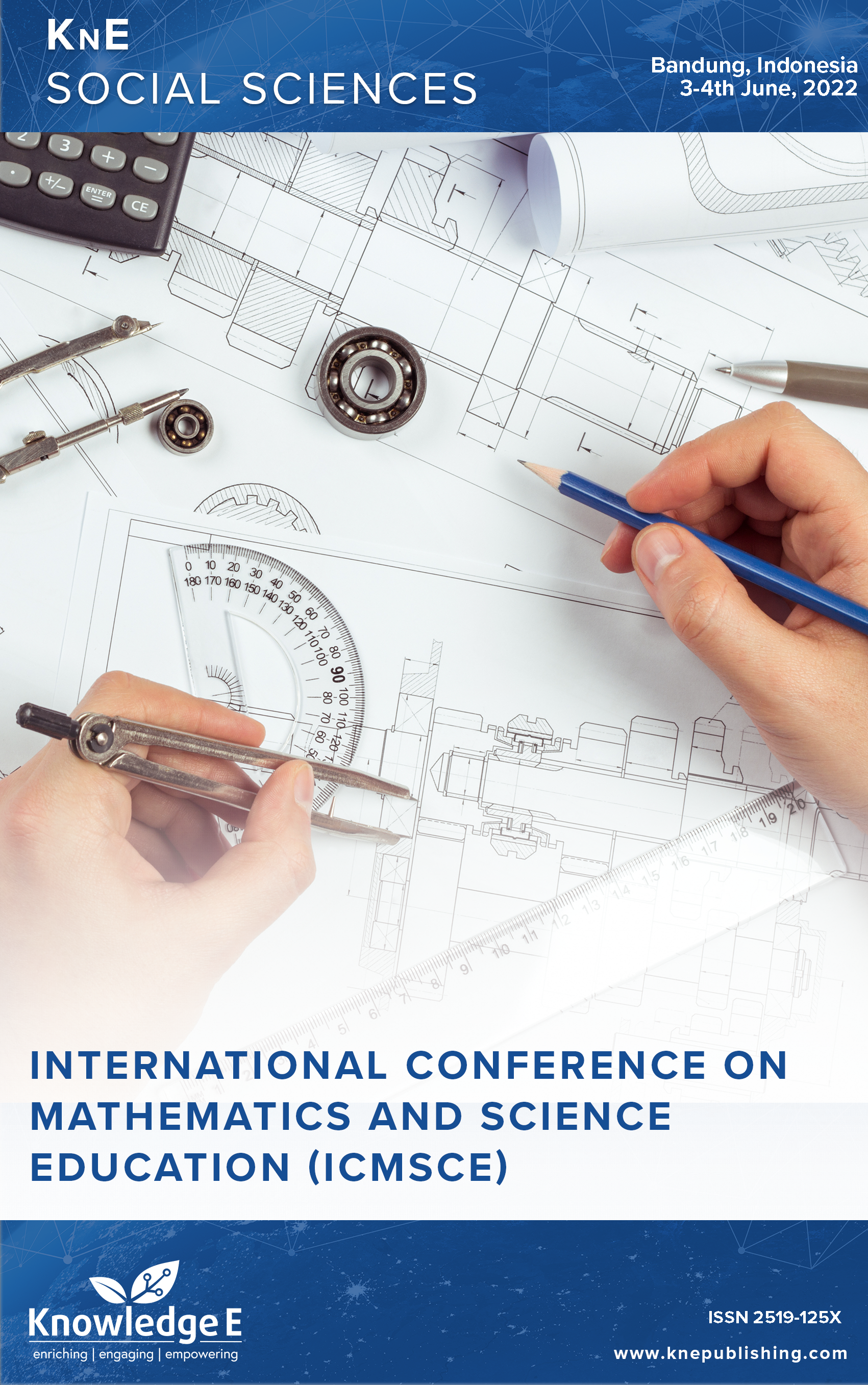Application of Genetic Problem-Based Online Discussion to Improve Communication and Collaboration Skills for Teacher Candidates
DOI:
https://doi.org/10.18502/kss.v9i13.16003Abstract
Communication and collaboration skills are important skills that prospective teachers need to have. This ability is trained in genetics courses through online discussion activities based on genetic problems. The purpose of this study was to determine the effect of applying genetic problem-based online discussions on communication and collaboration skills among prospective teachers in discussing genetic problem solving. This research was conducted experimentally in three different classes in applying genetic problems, namely problems from students, problems from students and instructors, and problems from instructors. Students’ communication and collaboration skills were measured through the observation of online discussion activities. Discussion activities were carried out during four genetic lecture meetings, with four discussion themes on the basic material of chromosomal inheritance. Analysis of students’ communication and collaboration skills using MANOVA tests and post hoc differences tests with SPSS 22 to determine differences in students’ communication and collaboration skills in each class. The results showed that there was an increase in students’ communication and collaboration skills with the application of online discussions based on genetic problems, with the highest increase in classes that implemented online discussions with students’ problems.
Keywords: Genetic Problem-Based, Communication and Collaboration Skills, Teacher Candidates
References
Maryuningsih Y, Hidayat T, Riandi R, Rustaman N. Developing gen-21cs on smartphone to cultivate the 21st-century skills on biology teacher candidates [ Jurnal Pendidikan Biologi Indonesia]. JPBI. 2019;5(3):415–24. DOI: https://doi.org/10.22219/jpbi.v5i3.9714
Maryuningsih Y, Hidayat T, Riandi R, Rustaman NY. Critical thinking skills of prospective biology teacher on the chromosomal basic of inheritance learning through online discussion forums. J Phys Conf Ser. 2019;1157(2):1–7. DOI: https://doi.org/10.1088/1742-6596/1157/2/022090
Hedin L, Conderman G. Pairing teachers for effective co-teaching teams. Kappa Delta Pi Rec. 2019;55(4):169–73. DOI: https://doi.org/10.1080/00228958.2019.1659063
Care E, Griffin P, Wilson M. Assessment and teaching of 21st century skills reseach and applications. Dordrecht, The Netherlands: Springer; 2012. DOI: https://doi.org/10.1007/978-94-007-2324-5
Chai CS, Deng F, Tsai PS, Koh JH, Tsai CC. Assessing multidimensional students’ perceptions of twenty-first-century learning practices. Asia Pac Educ Rev. 2015;16(3):389–98. DOI: https://doi.org/10.1007/s12564-015-9379-4
Savin-Baden M. A practical guide to problem-based learning online. Madison Ave (New York): Routledge; 2007. https://doi.org/10.4324/9780203938140. DOI: https://doi.org/10.4324/9780203938140
Maryuningsih Y, Hidayat T, Riandi R, Rustaman N. Developing performance assessment instruments to measure 4c skills in online discussion activities of science learning. Scientiae Educatia. 2020;9(1):109. DOI: https://doi.org/10.24235/sc.educatia.v9i1.7500
Beuchot A, Bullen M. Interaction and interpersonality in online discussion forums. Distance Educ. 2005;26(1):67–87. DOI: https://doi.org/10.1080/01587910500081285
Quinn ED, Cook A, Rowland C, Quinn ED, Cook A, Rowland C. An online community of practice to improve intervention for individuals with complex communication needs. Augment Altern Commun. 2019 Jun;35(2):142–7. DOI: https://doi.org/10.1080/07434618.2019.1566400
Carlgren T. Communication, critical thinking, problem solving: a suggested course for all high school students in the 21st century. Interchange. 2013;44(1–2):63–81. DOI: https://doi.org/10.1007/s10780-013-9197-8
Batardière MT. Promoting critical thinking in online intercultural communication. The EuroCALL Review. 2015;23(1):3. DOI: https://doi.org/10.4995/eurocall.2015.4562
Bagdasarov Z, Luo Y, Wu W. The influence of tablet-based technology on the development of communication and critical thinking skills: an interdisciplinary study. J Res Technol Educ. 2017;49(1–2):55–72. DOI: https://doi.org/10.1080/15391523.2017.1293576
Cantor A, Hippman C, Hercher L, Austin JC. Genetic counseling students’ experiences with mental illness during training: an exploratory study. J Am Coll Health. 2019;67(4):348–56. DOI: https://doi.org/10.1080/07448481.2018.1481076
Burian RM. On gene concepts and teaching genetics: episodes from classical genetics. Sci Educ. 2013;22(2):325–44. DOI: https://doi.org/10.1007/s11191-011-9367-y
Kuo YC. Accelerated online learning: perceptions of interaction and learning outcomes among african american students. Am J Distance Educ. 2014;28(4):241– 52. DOI: https://doi.org/10.1080/08923647.2014.959334
Bromham L, Oprandi P. Evolution online: using a virtual learning environment to develop active learning in undergraduates. J Biol Educ. 2006;41(1):21–5. DOI: https://doi.org/10.1080/00219266.2006.9656052
Beckmann J, Weber P. Cognitive presence in virtual collaborative learning: assessing and improving critical thinking in online discussion forums. Interact Technol Smart Educ. 2016;13(1):52–70. DOI: https://doi.org/10.1108/ITSE-12-2015-0034
Moore JL, Dickson-Deane C, Galyen K. E-learning, online learning, and distance learning environments: are they the same? Internet High Educ. 2011;14(2):129–35. DOI: https://doi.org/10.1016/j.iheduc.2010.10.001
T. Anderson, The theory and practice of online learning. AU Press, Athabasca University, 1200, 10011 – 109 Street Edmonton, AB T5J 3S8, 2008.
Akyol Z, Garrison DR. Understanding cognitive presence in an online and blended community of inquiry: assessing outcomes and processes for deep approaches to learning. Br J Educ Technol. 2011;42(2):233–50. DOI: https://doi.org/10.1111/j.1467-8535.2009.01029.x
Lawlor J, Conneely C, Oldham E, Marshall K, Tangney B. Bridge21: teamwork, technology and learning. a pragmatic model for effective twenty-first-century teambased learning. Technol Pedagogy Educ. 2018;27(2):211–32. DOI: https://doi.org/10.1080/1475939X.2017.1405066
Kivunja C. Teaching students to learn and to work well with 21st century skills: unpacking the career and life skills domain of the new learning paradigm. Int J High Educ. 2014;4(1):1–11. DOI: https://doi.org/10.5430/ijhe.v4n1p1
Cann AJ, Calvert JE, Masse KL, Moffat KG. Assessed online discussion groups in biology education. Biosci Educ E-J. 2006;8(1):1–11. DOI: https://doi.org/10.3108/beej.8.4
Matheson R, Wilkinson SC, Gilhooly E. Promoting critical thinking and collaborative working through assessment: combining patchwork text and online discussion boards. Innov Educ Teach Int. 2012;49(3):257–67. DOI: https://doi.org/10.1080/14703297.2012.703023

